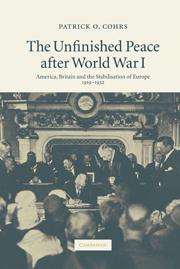Book contents
- Frontmatter
- Contents
- Acknowledgements
- List of abbreviations
- A note on the footnotes and bibliography
- Introduction
- Prologue
- 1 The wider challenges
- 2 Wilson, Lloyd George and the quest for a ‘peace to end all wars’
- 3 The ill-founded peace of 1919
- 4 The escalation of Europe's post-Versailles crisis, 1920–1923
- Part I The Anglo-American stabilisation of Europe, 1923–1924
- Part II Europe's nascent Pax Anglo-Americana, 1924–1925
- Part III The unfinished transatlantic peace order: the system of London and Locarno, 1926–1929
- 17 Sustaining stability, legitimating peaceful change
- 18 Progressive visions and limited commitments
- 19 ‘Reciprocity’?
- 20 The new European concert – and its limits
- 21 Thoiry – the failed quest for a ‘final postwar agreement’
- 22 Towards peaceful change in eastern Europe?
- 23 Achievements and constraints
- 24 No ‘new world order’
- 25 The initiation of the Young process
- 26 The last ‘grand bargain’ after World War I
- Epilogue
- Conclusion
- Map: Post-World War I Europe after the peace settlement of Versailles
- Bibliography
- Index
21 - Thoiry – the failed quest for a ‘final postwar agreement’
Published online by Cambridge University Press: 21 July 2009
- Frontmatter
- Contents
- Acknowledgements
- List of abbreviations
- A note on the footnotes and bibliography
- Introduction
- Prologue
- 1 The wider challenges
- 2 Wilson, Lloyd George and the quest for a ‘peace to end all wars’
- 3 The ill-founded peace of 1919
- 4 The escalation of Europe's post-Versailles crisis, 1920–1923
- Part I The Anglo-American stabilisation of Europe, 1923–1924
- Part II Europe's nascent Pax Anglo-Americana, 1924–1925
- Part III The unfinished transatlantic peace order: the system of London and Locarno, 1926–1929
- 17 Sustaining stability, legitimating peaceful change
- 18 Progressive visions and limited commitments
- 19 ‘Reciprocity’?
- 20 The new European concert – and its limits
- 21 Thoiry – the failed quest for a ‘final postwar agreement’
- 22 Towards peaceful change in eastern Europe?
- 23 Achievements and constraints
- 24 No ‘new world order’
- 25 The initiation of the Young process
- 26 The last ‘grand bargain’ after World War I
- Epilogue
- Conclusion
- Map: Post-World War I Europe after the peace settlement of Versailles
- Bibliography
- Index
Summary
In Chamberlain's words, a ‘breeze from Locarno blew through the stuffy hall of the Assembly’ when on 10 September 1926 the German delegation was received into the Société des Nations, ‘well … but not too boisterously’. With its successful accession to the League, an important first stage in Germany's reintegration into the international system after 1918 had been concluded. At the same time, this reintegration had found its publicly most recognisable expression. It was more than a symbolic moment in post-World War I international history. Yet it was by no means an end-point to the underlying processes of European stabilisation underway since the Ruhr crisis.
Concretely, the study commission charged with proposing a way out of the Council crisis in March had completed its task in time. The League Council followed its recommendation that only Germany be granted a permanent seat while the number of non-permanent seats was increased from six to nine. Of these, one was to fall to Poland, de facto with a guarantee of eligibility for re-election after three years. Up to the last minute, Chamberlain, Cecil and their continental counterparts had been ‘involved in petty jealousies and squabbles’ to secure this outcome. The British foreign secretary had finally impressed on Briand and Skrzyński that Poland was in danger ‘of losing everything by asking too much’. But the ‘bargain’ had ultimately been carried through.
- Type
- Chapter
- Information
- The Unfinished Peace after World War IAmerica, Britain and the Stabilisation of Europe, 1919–1932, pp. 378 - 408Publisher: Cambridge University PressPrint publication year: 2006



